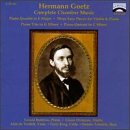AHHHHHH...... GOETZ
Melvyn M. Sobel | Freeport (Long Island), New York | 09/12/2001
(5 out of 5 stars)
"As in his piano music, I find the wistful, German-born composer Hermann Gustav Goetz [1840-1876] at his most original, unassuming, melodic and nostalgic in these four chamber works that, from simplest to complex, form his sole output. And, as in his piano music, again, we find a "pure" Goetz with scarcely a hint of derivation in any direction. How these beautiful works languished for over one hundred years simply boggles the mind; their CD incarnation, then, is cause to rejoice, especially in performances like these, so attuned to the Goetz spirit, the joy, the melancholy, the romance and tragedy.
How could one not fall instantly in love with the Piano Quartet in E, Op. 6 (1867)? The opening theme of the first movement (7:57), alone, is glorious--- it soars, leading us directly into a secondary development whose lyricism plunges straight to our heart; throughout, Goetz intertwines these melodies hauntingly. The following Langsam (11:06), filled with a languid, aching romanticism (so akin to the composer's more intimate works), is probably one of the most moving you will have heard in a long, long time. Engaging, too, is its seque into the Scherzo (4:53), without pause. This ingenious co-joining is so graced, I can't blame Goetz for allowing his emotions to flood out. And with another brilliant stroke, the composer begins the Sehr langsam finale (8:31), not in merriment, but with yet another heart-rending theme that wrings us dry before breaking out in songful elation.
The Three Easy Pieces for Violin and Piano of 1863, Op. 2 (12:07), are fairly lightweight works, but are nonetheless attractive "chips" from the Goetz workbench, especially the endearing "Romanze."
The Piano Trio in G Minor, Op. 1, also composed in 1863 (24:42), is a splendid, multi-faceted jewel whose Langsam first movement, initially dark-hued, but turning zesty, resolves into the consummate beauty of the second movement, Sehr ruhig. Melodies like these are simply too gorgeous to describe. They must be heard. The Fluchtig-Erregt, following, brings us into some Mendelssohnian territory, briefly and lightly, and the concluding Massig rasch, knitting and weaving previous themes in a tapestry of sorrow and joy, with piano dancing, strings plucking or consoling, ends in a perfect, boisterous surge that is irresistible.
With the Piano Quintet in C Minor, Op. 16 (25:28), written in 1874, a mere two years before the composer's ridiculously untimely death, we enter a world darker and deeper. Here Goetz truly examines his soul, his fears, the ultimate doom he knew was coming, and over which he had no control. The Quintet is his ultimate expression of life's wonder and futility--- beautiful and intense--- and his final "raging at the dying of the light." The stunningly moving Andante, with its strings conversing back and forth, as in prayer, and the piano comforting them, is simply sublime.
Sublime, as well, is the playing of every member of this wonderful ensemble, each deserving the highest praise. The sound given them is intimate, warm, immediate, and does full justice to the music of this humble composer.
[Running time--- CD 1: 45:02 CD 2: 50:21]"


 Track Listings (7) - Disc #1
Track Listings (7) - Disc #1